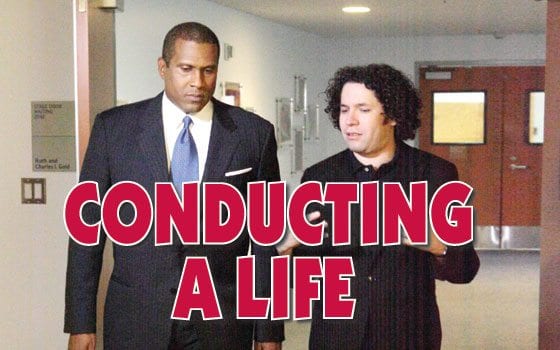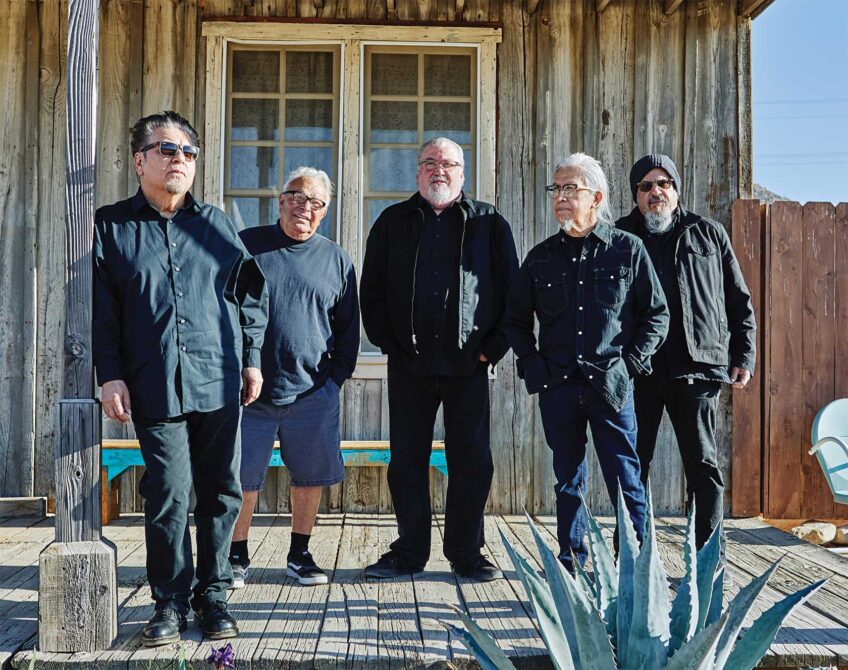Tavis Smiley talks about his latest special report on conductor Gustavo Dudamel and the fate of music education


Tavis Smiley talks about his latest special report on conductor Gustavo Dudamel and the fate of music education
Due to school budget cuts across the country, music education programs are being eliminated from school curricula at a rapid pace. However, many concerned individuals, including Los Angeles Philharmonic conductor Gustavo Dudamel, are adamant about ensuring that kids continue to be exposed to the enriching world of music.
The fourth installment of PBS’ Tavis Smiley Reports is “Gustavo Dudamel: Conducting a Life,” and profiles the young conductor and asks the question: What price will the country pay for abandoning music education for our children?
I really enjoyed watching this primetime special. What inspired you to devote the show to Dudamel and his mission to preserve music programs in schools?
Dudamel is obviously a rock star in the world of classical music. But for me, he’s also a way of opening up a broader conversation about the price we are ultimately going to pay, as a country, for abandoning music education in our schools. Every study ever done underscores the value of music education to young children, and the benefits that come from being exposed to music early on. And yet, one of the first things on the chopping block, when we talk about public education, are the music programs. I just think that, long term, there’s a heavy price we’re going to pay for abandoning music education.
Dudamel is also passionate about this, because as a child he benefited from a publicly-financed music program in his native Venezuela called El Sistema, which is precisely the type of program we need in this country. So, there’s no downside to doing a piece about Dudamel who Quincy Jones referred to as “The Next Leonard Bernstein.” When Quincy calls you “The Next Leonard Bernstein,” that’s huge.
How do you think America can move away from a predominant focus on sports and provide equal funding for music and the arts? And what is the cost to society in the long run of eliminating funding for music and the arts?
Let me answer the second part of that question first. The cost, long-term, is too high. What we’re abandoning is the one part of the school day devoted to encouraging kids to be creative, to think outside of the box, and to connect with their emotions. I believe that any generation that doesn’t embrace music will be a lost generation. As far as what can be done about it, that’s what the special is all about. Dudamel has a very ambitious plan to replicate the El Sistema program that he is a product of in big cities and small towns all across the United States. I think it starts, at a rudimentary level, with putting music back in the classroom. That’s the least we can do as a starting point.
It concerns me that the focus of your special seems to be classical music; but when I think of the age and maturity level of a typical student, I know that in most cases they aren’t going to jump on the classical bandwagon before the music they hear on the radio.
That’s a very good question. One of the greatest artists ever, Stevie Wonder, was listening to classical music and playing jazz, like John Coltrane, when he was 13. I’m always amazed at how many artists in all sorts of genres started out taking piano lessons and playing classical. But I do understand the concern, and I even asked Dudamel in the special. “How do you get young folk interested in Beethoven and Brahms, when they’d rather listen to Beyoncé?” His response was basically that it doesn’t have to be either/or. It can be both/and. They don’t have to choose Beyoncé over Brahms or vice-versa. The kids should be exposed to both.
The music education of El Sistema focuses on classic European music for the most part. What about the music of indigenous peoples?
The short answer is: I think there’s room for everything. Dudamel himself is an advocate of exposing the kids to everything. But the reality is that at the moment they’re being exposed to nothing.
Should music education also include music business education given the history of artists of color signing bad contracts and getting ripped-off?
Yes. I think that as people get deeper into the music, especially if they’re contemplating a career in music, they certainly should be taught about those business issues. That being said, there is still so much music has to offer, whether or not we ever go into the music business.
Since our country does not have the kind of state system we see in where children are recruited at an early age and trained at state expense, how can we find our talented young artists, especially among the youth whose parents can’t afford private lessons?
As you know, in this special, we profile a school in Boston where students get music education along with the regular curriculum. Their school day is a little longer, but the kids love it because they get to play music everyday. That’s the sort of program where you discover the prodigies, the gifted ones with potential. That’s how Dudamel was discovered.
With newspaper headlines announcing how far behind we are in math, science and reading, how can we continue to demonstrate that the arts — not just music — are part of the educational empowerment of America’s best and brightest.
Like I said before, all of the research indicates that when kids are exposed to music early in life, it positively impacts their comprehension and performance in every other area of their studies: math, the sciences, and so forth.
Give us three words which define Tavis Smiley.
Passionate, committed and hard working.
Do you have another book project in mind?
It’s funny you should ask that. I do. In fact, I have it sitting on my lap. I’m editing it right now. It’s called “Failed Up: 20 Lessons on Building Success from Failure.” The book is about the biggest mistakes I made in my life and how I learned from them. The publication date is May 1.
Who is your primary source of motivation? And what role does spirituality play in your life and who most shaped and informed your spirituality?
Jesus is the primary source of my motivation. Spirituality and my abiding faith are more important than anything else in my life. The three things that have sustained me are what I call the three f’s, in this order, faith, family and friends. My mother, Joyce Smiley, is the person most responsible for motivating me.
How would you define your purpose in life as it pertains to communication and media?
I think information is power, and I see my platform as one which gives me the opportunity to challenge people to reexamine the assumptions they hold, and to help them expand their inventory of ideas. Right along with that, I love being able to introduce Americans to each other. I’m blessed being able to cross-pollinate, culturally.
What grade would you give President Obama after his first two years in office?
Obviously, he’s enjoyed some major political victories the last couple weeks. But the things that concern me are yet to be addressed, including the issue of poverty and all the hell that people, especially black people, are catching in this economy. I’m reluctant to give grades, but I’m concerned that the White House still has not focused enough on the issue of economic opportunities for everyday people. That’s the banner that I’m still flying.






